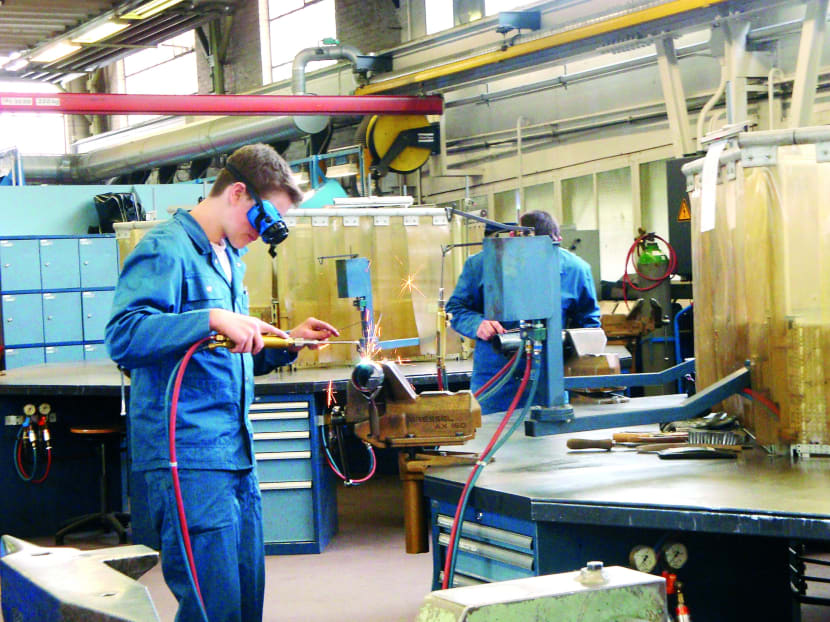Swiss model of vocational education offers lessons for Singapore
ZURICH — Student Mirja Jenzer spends four days a week as an apprentice at a clinic and one day at a vocational school as part of medical assistant apprenticeship, instead of plugging away at her studies in a classroom.
ZURICH — Student Mirja Jenzer spends four days a week as an apprentice at a clinic and one day at a vocational school as part of medical assistant apprenticeship, instead of plugging away at her studies in a classroom.
She might not have made the switch from an academic programme to a vocational one, if not for a timely session at a local career counselling centre, one of many located all over Switzerland providing free services like one-on-one counselling and psychometric tests assessing interests and aspirations of students. “I want to be helping people,” said Ms Jenzer, 20, explaining her switch.
Such a model, aimed at helping students consider their career aspirations, might be something Singapore wants to look at, said Senior Minister of State for Education and Law Indranee Rajah, who is visiting Switzerland and Germany to study their work-and-study models, as part of a review of the polytechnic and Institute of Education (ITE) system.
Speaking to the Singapore media on Wednesday (Feb 12), Ms Indranee noted that career guidance could help students and their parents view the vocational path more positively. Parents must recognise the value of technical skills training for the job market and to hone different talents, she said.
Ms Indranee chairs the Applied Study in Polytechnics and Institute of Education Review (ASPIRE) committee, which is reviewing polytechnic and ITE graduates’ career and academic prospects. The committee is also looking at how to improve links with industry to provide work-relevant training and career guidance for students.
Among other things, Ms Indranee highlighted the strong links between Swiss companies and vocational schools, and how the Swiss accord equal merit to both the academic and vocational routes. While the Swiss model cannot be adopted wholesale, Switzerland does a good job providing upward progression for students regardless of the study path they take, and this is something “worth studying”, she added.
In Switzerland, youths are required to complete nine years of education before they opt for either vocational education or the academic path. Both options allow students to eventually enroll in universities or professional colleges providing advanced vocational training, among other choices. Ms Jenzer, for example, may study social work at a university of applied sciences after she obtains higher vocational qualifications.
Career guidance is provided to students from as early as age 13. According to official statistics, about two-thirds of every cohort chooses the vocational route. Career counsellor Liselotte Stricker Meuli said students and their parents sometimes disagree on which route to pursue. She holds both joint and individual sessions for each side, and may even administer tests during counselling sessions to help the student project his or her own future in ten years’ time. “It takes time in this career counselling process, sometimes having many counselling sessions, to match everyone interests and come to a compromise,” she said.
Student apprentices interviewed said gaining financial independence and acquiring a skill is their priority. Hotel apprentice Demi Schneider, 18, said that the Swiss culture is to “do what you like” and there is no pressure to choose the academic path.
Working for three days at the five-star Hotel Schweizerhof Bern and studying for two days in a partner vocational school, she earns 1,000 Swiss Francs (S$1,400) a month and will receive 1,500 Swiss Francs (S$2,100) at the end of her apprenticeship. After that she graduates with a diploma, she can choose to start work or pursue higher education.
Mr Philipp Thalmann, head of learning and development at Swiss industrial engineering and manufacturing firm Sulzer, noted that the vocational education diploma — obtained after an apprenticeship — is an affirmation of a skilled worker and is highly valued by employers. This is because industry players help determine the rigor of the apprenticeships by setting the standards and assessments and also train them in their firms. “The apprenticeship system is part of our education system…it is (also) in the DNA in Swiss companies…to invest in our people,” he said.
ASPIRE committee member Tan Choon Shian, Singapore Polytechnic principal, said that providing career counselling could help students be more aware of their strengths. It would take time for Singapore to find its own balance, as the “Swiss (also) evolved over the years for the Government, schools and employers to figure out what is their part to play”, he added.







